
 Pete Bauer
The Hockey Writers
Pete Bauer
The Hockey Writers
33
Reads
0
Comments
Blue Jackets 2019 Playoffs Bode Well for 2020 Postseason
Let’s start by addressing the big difference between the 2019 NHL Playoff Columbus Blue Jackets and the 2020 postseason Blue Jackets: Lots of talent left coach John Tortorella’s team as free agents last summer. Nonetheless, I think a deep look into the Blue Jackets’ playoff performance last summer bodes well for this postseason. (Note that I used “postseason” rather than “playoffs.” Columbus must win a five-game Qualification Round against the Toronto Maple Leafs prior to participating in the actual 2020 Playoffs.)

Leaving Columbus as free agents were forwards Artemi Panarin, Matt Duchene, and Ryan Dzingel, as well as star goalie Sergei Bobrovsky and a couple of others. Panarin led the team in playoff scoring with 11 points in 10 games, Duchene finished second with 10 points, and Dzingel produced only a single point in nine games. Panarin had been with the Blue Jackets for two years, while Duchene and Dzingel were added in the days just before the trade deadline.
A couple of other players picked up by the Blue Jackets at the 2019 trade deadline were allowed to walk as free agents. Defenseman Adam McQuaid played in 14 regular season games and no playoff games for Columbus. Goalie Keith Kinkaid didn’t take the ice at all for Columbus.
Blue Jackets 2019 Playoff by the Numbers
Columbus played 10 postseason games in 2019, a four-game sweep of the Presidents’ Trophy-winning Tampa Bay Lightning and a six-game loss to the eventual Eastern Conference champion Boston Bruins. Here’s a look at the Blue Jackets’ basic stats for the 2019 Playoffs (minimum four games played):
| Name | Games | Goals | Assists | Points | ATOI | Relative Corsi For % | Relative Fenwick For % | PDO |
|---|---|---|---|---|---|---|---|---|
| Artemi Panarin | 10 | 5 | 6 | 11 | 21:44 | 6.7 | 5.7 | 100.1 |
| Matt Duchene | 10 | 5 | 5 | 10 | 16:47 | -3.4 | -4.5 | 100.9 |
| Seth Jones | 10 | 3 | 6 | 9 | 28:32 | 3 | 2.8 | 99 |
| Cam Atkinson | 10 | 2 | 6 | 8 | 18:29 | 2.4 | 2.2 | 99.3 |
| Zach Werenski | 10 | 1 | 5 | 6 | 26:37 | 1.4 | 0.6 | 98.4 |
| Oliver Bjorkstrand | 10 | 2 | 3 | 5 | 15:06 | 2.9 | 3.7 | 100.4 |
| Pierre-Luc Dubois | 10 | 2 | 3 | 5 | 17:28 | 2.8 | 2.6 | 101.5 |
| Scott Harrington | 10 | 0 | 4 | 4 | 13:35 | -3.1 | -2.7 | 100.9 |
| Alexandre Texier | 8 | 2 | 1 | 3 | 11:25 | -13.4 | -13.4 | 123.1 |
| Riley Nash | 7 | 1 | 2 | 3 | 13:32 | -1.3 | 0.1 | 97.3 |
| David Savard | 10 | 1 | 2 | 3 | 23:42 | -0.8 | -0.1 | 102.2 |
| Nick Foligno | 10 | 1 | 2 | 3 | 18:36 | -3.2 | -3.1 | 102.8 |
| Boone Jenner | 10 | 1 | 2 | 3 | 17:13 | -2.6 | -2 | 101.2 |
| Josh Anderson | 10 | 1 | 2 | 3 | 16:59 | -0.4 | -1.7 | 103.9 |
| Adam Clendening | 7 | 0 | 1 | 1 | 08:45 | -7.7 | -12.1 | 107.1 |
| Dean Kukan | 10 | 1 | 0 | 1 | 15:10 | 1.8 | 2.4 | 102.7 |
| Ryan Dzingel | 9 | 1 | 0 | 1 | 11:20 | -3.4 | -4.5 | 104.6 |
| Brandon Dubinsky | 10 | 1 | 0 | 1 | 13:06 | -5.9 | -3.6 | 94.8 |
| Alexander Wennberg | 4 | 0 | 0 | 0 | 10:29 | 1.3 | 0.4 | 98.4 |
No matter how you look at those numbers, the loss of Panarin and Duchene seems devastating. (Dzingel? Not so much.) They were the only forwards with more than two goals (five each), and the only players, regardless of position, who hit double figures in points and averaged at least a point per game. Combined, the two former Blue Jackets scored one-third of the team’s playoff goals.
Not Just How Many Points, But When and How
However, not all goals and points are created equal. Consider, if you will, the difference between a couple of goals in the first two games against the Lightning. Josh Anderson scored a shorthanded goal in Game 1 to tie the score in the middle of the third period. Panarin scored a goal (with an assist from Duchene) in Game 2 that makes a 4-1 game a 5-1 game. One goal evened the score after the Blue Jackets were down 3-0 in an eventual 4-3 victory. The other goal padded the score of a game that was already a blowout.
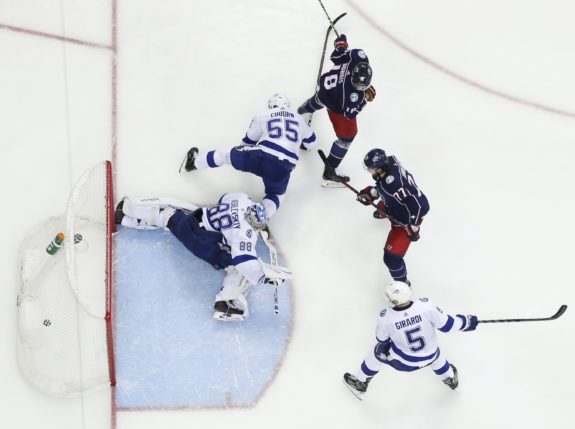
Let’s break down, game by game, the goals and assists scored by Panarin and Duchene:
- Blue Jackets vs. Lightning, Game 1: [Blue Jackets won 4-3] Panarin had the primary assist on Seth Jones’s game-winning, power-play goal. Duchene was scoreless.
- Blue Jackets vs. Lightning, Game 2: [Blue Jackets won 5-1] Duchene racked up 4 of his 10 playoff points in a single game. He assisted on the first two goals, scored the third goal, and added another assist on Panarin’s score-padding goal. Panarin also had an assist on Duchene’s goal.
- Blue Jackets vs. Lightning, Game 3: [Blue Jackets won 3-1] Duchene scored the first goal for Columbus; Panarin assisted on Cam Atkinson’s empty-net goal with one minute to play.
- Blue Jackets vs. Lightning, Game 4: [Blue Jackets closed out the sweep, 7-3] Columbus had 7 goals and 12 assists total. Panarin and Duchene both scored empty-net goals with under two minutes to play. Duchene also had an assist on the third Blue Jackets goal.
- Blue Jackets vs. Bruins, Game 1: [Bruins won 3-2 in OT] Panarin had an assist on the second Blue Jackets goal; Duchene was scoreless.
- Blue Jackets vs. Bruins, Game 2: [Blue Jackets won 3-2] This was the game when the soon-to-be-free-agents shined! Panarin scored the Blue Jackets’ first two goals, Duchene had the game-winning goal off an assist from Panarin. The pair accounted for all three of the Columbus goals.
- Blue Jackets vs. Bruins, Game 3: [Blue Jackets won 2-1] Duchene scored the eventual game-winner on a power play in the middle of the second period. Panarin was scoreless. This was the last game of the playoffs in which either Panarin or Duchene had a significant impact.
- Blue Jackets vs. Bruins, Game 4: [Bruins won 4-1] Panarin had the only Columbus goal and Duchene was scoreless as the Bruins evened the series at two games.
- Blue Jackets vs. Bruins, Game 5: [Bruins won 4-3] Panarin and Duchene each had an assist; Dzingel scored his only point.
- Blue Jackets vs. Bruins, Game 6: [Bruins finished the series with a 3-0 win] Nobody scored for Columbus.
Indeed, both Panarin and Duchene made substantial contributions in several games. On the other hand, 10 of their combined 21 points came in the Game 2’s of each series. Each also had empty-net goals in closing minutes of the final game against the Lightning, goals that were pretty much meaningless (unless you were at Nationwide Arena or watching on TV, of course).
Blue Jackets Goaltending
The other major free agent who left Columbus last summer, two-time Vezina winning goaltender Bobrovsky, signed a massive seven-year $70 million contract with the Florida Panthers. His first season in Florida was a major disappointment. Statistically, he finished the year far behind the Blue Jackets’ goalies, Elvis Merzklikins and Joonas Korpisalo.
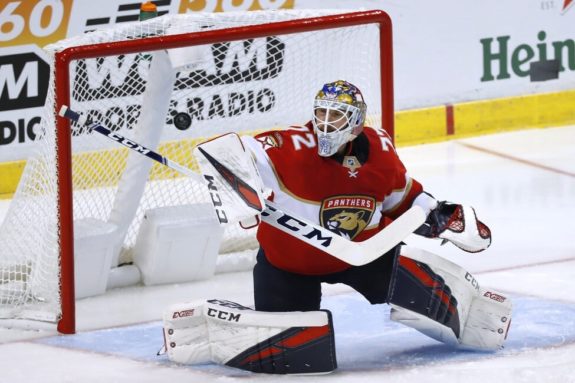
As far as the goalie issue is concerned, you could say that it’s not a concern. With the performance of Merzlikins and Korpisalo, Columbus looks solid in goal. Granted, neither has been tested in a playoff-like situation in the NHL, such as the upcoming Qualification Round. But is it worse to have no NHL playoff experience or to have lost six of seven playoff series, as has Maple Leafs starter Frederik Andersen?
Related: Korpisalo or Merzlikins: Which Blue Jackets Goalie Starts?
Keep in mind that Merzlikins has 50 playoff games experience in the Swiss A league and has played in international tournaments for his native Latvia. Korpisalo’s pre-NHL playoff experience is much more limited, with a pair of games in the SM-liiga and nine in the AHL four seasons ago.
Columbus Defense
The Blue Jackets’ defensive core remains virtually unchanged – and that’s a very good thing. It’s a subjective evaluation (or perhaps nothing more than personal opinion), but only the Carolina Hurricanes’ defensive depth may be comparable to the Blue Jackets. Seth Jones has become a regular in the James Norris Trophy discussion. In 2019-20, he managed 30 points in just 56 games. Werenski’s 20 goals in 63 games were four more than the next defenseman in the league.

Four of the Blue Jackets’ top 16 scorers were defensemen. Five of the 13 best plus/minus ratings were defensemen. Five defensemen played close to or over 19 minutes per game, led by Jones (24:16) and Werenski (23:59). Only one defenseman (Savard) was in the team’s top six in penalty minutes. Eight of the team’s 31 power-play goals were scored by the D. Twenty of 58 power-play assists were credited to defensemen. One-third of the team’s shorthanded points were by defensemen. (Full disclosure: That was only two of six points, but you get the significance.)
Blue Jackets 2019 vs. Blue Jackets 2020
In the 2018-19 regular season, Columbus scored 258 goals. If we prorate 2019-20 from the 180 goals in 70 games to an 82-game season, Columbus would likely have been around 211 goals. That’s a drop off of almost 20%. Panarin contributed 28 of the 2018-19 goals, slightly more than 10%. In 23 games, Duchene chipped in only four regular-season goals (as did Dzingel in 21 games).
Related: Maple Leafs’ Health & Experience Key to Beating Blue Jackets
Defensively, the 2018-19 Blue Jackets allowed 232 goals during the regular season. In 2019-20, they let in 187 goals in 70 games, which works out to 219 goals in an 82-game season. The year-to-year team plus/minus dropped from a plus-26 to a pro-rated minus-8. Since the difference (prorated to 82 games) was 47 fewer goals scored and 13 fewer goals against, we can safely say that the offensive drop off was significantly more important than the defensive side of the game.
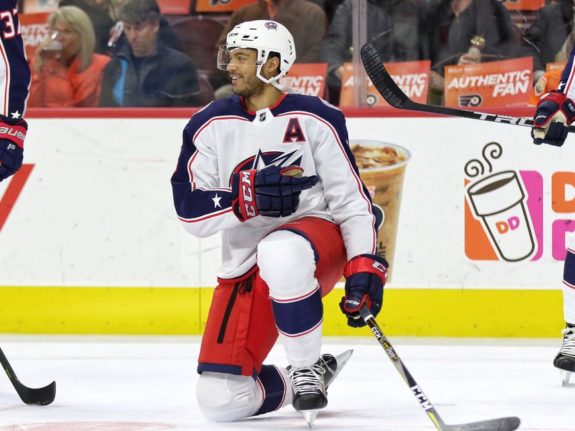
Only two teams scored fewer goals per game in 2019-20 than did the Blue Jackets. At the other end of the spectrum, only two teams scored more goals per game than Qualification Round opponent Toronto.
Some Blue Jackets players didn’t meet expectations in 2019-20 (Atkinson: 12 goals down from 41, Anderson: 1 goal in 26 games vs. 27 in 82); some players exceeded expectations, including Werenski’s league-leading 20 goals by a defenseman. The addition of Gus Nyquist’s 15 goals also helped. But the biggest drag on Columbus in 2019-20 may not have been the loss of free agents, but rather the near-constant, league-leading 420 man games lost to injury.
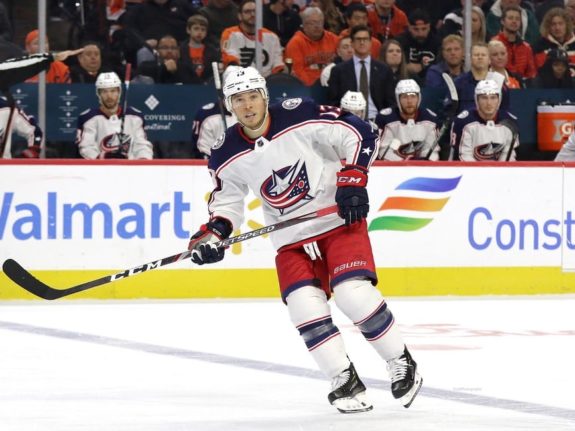
Of the 33 skaters who took the ice for the Blue Jackets in 2019-20, only three played in all 70 games: Pierre-Luc Dubois, Nyquist, and Boone Jenner. Even more startling is that only 13 skaters took the ice for at least 2/3 of the games. Eleven played 3/4 of the games. (In contrast, the Washington Capitals had 18 skaters play at least 3/4 of their games and the Nashville Predators had 17 play at least 2/3 of their 69 games.)
Blue Jackets Qualification Round Roster
The injury bug will be mostly swatted by the time the puck drops for Game 1 against Toronto. Josh Anderson (shoulder surgery) will likely miss the series, as will Brandon Dubinsky (wrist). But the rest of the lineup should be fully healthy.
Related: Blue Jackets Top Prospect Foudy Ready for Prime Time
And young forward Liam Foudy will be in the lineup. He doesn’t have Panarin’s experience and pedigree, but there’s a chance that someday soon he’ll make many Blue Jackets fans say “Artemi who?” Columbus has a pair of potential game-stealers available for the net. Remember that young Elvis recorded five shutouts over the course of eight games. Three of those five came against teams in the top-third of the league in scoring (Florida, the Vegas Golden Knights, and the Bruins).
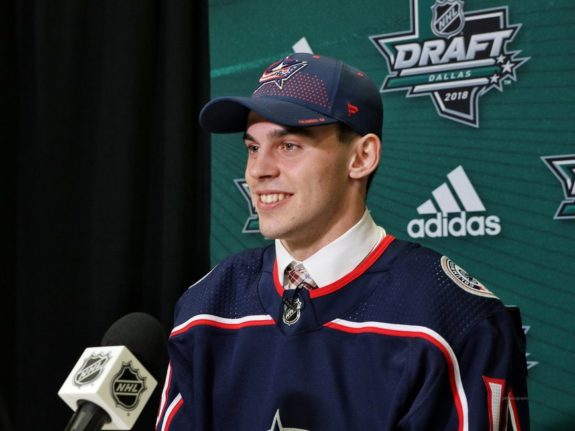
Let’s not forget the man behind the bench. In the past 15 seasons, Tortorella has missed the playoffs only four times. The non-playoff years include 2013-14, when he coached a weak Vancouver Canucks team, and the following season when he took over the Blue Jackets after an 0-7 start. He won the Jack Adams Award as coach of the year in 2017 and the Stanley Cup with Tampa Bay in 2003-04. He could be the “X-Factor” in the Qualifying Round.
Columbus: 2020 Qualification Round and Beyond!
Assuming all goes according to the NHL’s current plan, the Columbus Blue Jackets will play a best-of-five Qualification Round against the Toronto Maple Leafs in, of all places, Toronto. The winner advances to the actual Stanley Cup Playoffs. (The loser of the series, on the other hand, has a chance to pick first in the NHL Entry Draft.)
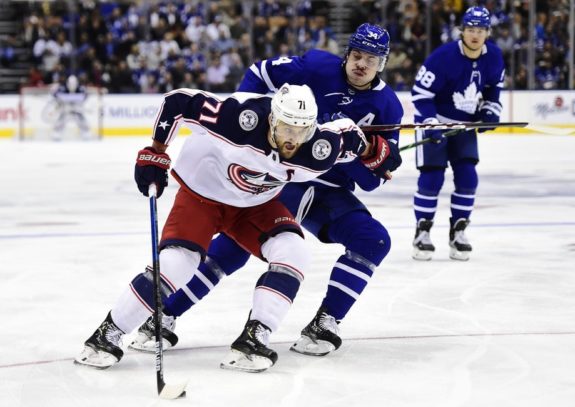
The Maple Leafs will have “home-ice advantage” not because the games will be played in the hub city of Toronto, but rather because they finished ahead of the Blue Jackets in points percentage by a tie-breaker. There will not be an arena of screaming fans to support the Maple Leafs, but home ice does have advantages. In a five-game series, “home” vs. “away” is three games to two – if the series goes the distance.
The two teams finished the season with 81 points in 70 games. After hiring coach Sheldon Keefe, the Maple Leafs played an up-tempo, high-scoring style. The Blue Jackets, in contrast, played a physical in-your-face style, the same style that produced the four-game sweep of the Lightning last year. I expect that 2019 playoff series against Tampa Bay is the template for Columbus to reach the playoffs for the fourth straight year.
The post Blue Jackets 2019 Playoffs Bode Well for 2020 Postseason appeared first on The Hockey Writers.
Popular Articles

















































 Blackhawks Chicago
Blackhawks Chicago Panthers Florida
Panthers Florida Penguins Pittsburgh
Penguins Pittsburgh Rangers New York
Rangers New York Avalanche Colorado
Avalanche Colorado Kings Los Angeles
Kings Los Angeles Maple Leafs Toronto
Maple Leafs Toronto Bruins Boston
Bruins Boston Capitals Washington
Capitals Washington Flames Calgary
Flames Calgary Oilers Edmonton
Oilers Edmonton Golden Knights Vegas
Golden Knights Vegas Flyers Philadelphia
Flyers Philadelphia Senators Ottawa
Senators Ottawa Lightning Tampa Bay
Lightning Tampa Bay Red Wings Detroit
Red Wings Detroit Islanders New York
Islanders New York Sabres Buffalo
Sabres Buffalo Devils New Jersey
Devils New Jersey Hurricanes Carolina
Hurricanes Carolina Stars Dallas
Stars Dallas Jets Winnipeg
Jets Winnipeg Blue Jackets Columbus
Blue Jackets Columbus Predators Nashville
Predators Nashville Wild Minnesota
Wild Minnesota Blues St. Louis
Blues St. Louis Mammoth Utah
Mammoth Utah Ducks Anaheim
Ducks Anaheim Sharks San Jose
Sharks San Jose Canucks Vancouver
Canucks Vancouver


